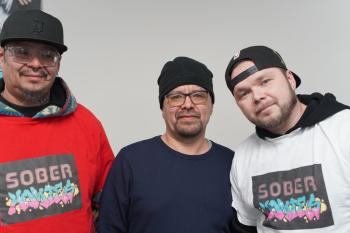Image Caption
Summary
Local Journalism Initiative Reporter
Windspeaker.com
In a poem by Jason Bourgeois, he describes the difference between purple and green crabs.
“Green crabs are kinda the bad crabs that pull you down and pull you under,” explained director/producer Jeromy Desjarlais. “And then the purple crabs are the ones that help each other out. Basically, be a purple crab.”
Dreamspeakers International Indigenous Film Festival is showcasing Desjarlais’ documentary about the work Bourgeois is doing in Edmonton. The documentary is titled Purple Crab.
“It is what they are. They are purple crabs,” Desjarlais said about Bourgeois and his organization called Sober Homies.
Bourgeois co-organized Sober Homies following his own struggles with addiction and in his desire to help those who are currently living through similar circumstances
“I started Sober Homies with the intention of getting people in early recovery, meeting and connecting with other sober people while doing a good deed along the way,” said Bourgeois.
“I know how volunteering or practicing altruism can do wonders for a person's self-esteem, self-worth, and help instill a sense of community and purpose.”
Once a week the Sober Homies gather and cook a warm meal to feed the less fortunate living in the downtown core of Edmonton.
This passion and kindness is what lit the fire within Desjarlais, who is from Muskowekwan First Nation, Sask. He is the owner of No Budget Films.
“I just thought it was just such a good thing. Getting people sober is the main thing, but actually how they get together and feed the less fortunate. I just found it so moving,” said Desjarlais. “So I wanted to get their story out so people could see what they are doing and possibly help them in some way.”
Desjarlais was first introduced to Sober Homies through Facebook when he received a friend request. After following their work over the social media platform for some time, he decided to travel from Saskatchewan to Alberta and film the Sober Homies doing their good work.
During the filming, Desjarlais explained how the temperatures dipped below minus-40 Celsius, but that didn’t stop them from continuing with what they had set out to do.
“It was so cold and he (Bourgeois) didn’t think anyone would show, but it was full,” said Desjarlais. “When I went there and really seen it, it really hit home.”
This compassion for others was captured in the documentary and is one of the main reasons the festival chose the film as one of the finalists.
“You could tell they were really interested in the program,” said Aretha Greatrix of Desjarlais’ film. She is the program director and festival facilitator of Dreamspeakers.
“There were a lot of interviews that showcased how they (Sober Homies) contribute to the community and taking their own experiences with being on the streets and fighting addictions and how they turn their own story around.”
Greatrix oversees all the details for the festival, as well as sits on the jury that decides the finalists from all the submissions.
This year there were more than 170 submissions, and 52 films were selected to be showcased at various locations throughout Edmonton from April 19 to April 23.
International films are included in the finalists, but the specific requirement is that the film must have a key creative person who is Indigenous working on it.
“We take films from all across the world,” explained Greatrix. “I like to have a mixture of established to new filmmakers, and from different locations. I like to do international because we are international, but I like to make sure we do have a good representation from local people as well.”
The festival defines an Indigenous person as described by the United Nation. “Indigenous communities, peoples and nations are those which, having a historical continuity with pre-invasion and pre-colonial societies that developed on their territories, consider themselves distinct from other sectors of the societies now prevailing on those territories, or parts of them.”
During the past 30 years, Greatrix said the festival has had situations arise where they needed to research submissions and if they fit the criteria.
“We’ve definitely learned more and more who the Indigenous people are around the world that fit this definition,” she said.
There are various categories for the submissions, including short and long documentaries, short and long features, animation and international.
This year, Dreamspeakers is also celebrating its 30th anniversary and is holding a celebration and awards ceremony on April 19.
Tickets for each showing, as well as the anniversary event are available through the website dreamspeakers.org.
Tickets can also be purchased at the various locations. Some screenings are pay what you can, said Greatrix.
Desjarlais said he is looking forward to seeing his film on the big screen during the festival and is hoping the Sober Homies will benefit from the publicity.
“I’m so grateful. When I set out to make Purple Crab I didn’t set out to win any awards or screenings… I set out just to help them and give them a boost,” he said.
Never miss a Windspeaker article. Subscribe Today to our new Windspeaker Newsletter!
Local Journalism Initiative Reporters are supported by a financial contribution made by the Government of Canada.

